Ellen Buckner is all about music, all the way. Her life has revolved around it since she was growing up in Atlantic, Iowa, a small town of around 7,000 people in between Omaha and Des Moines. She came from a family that loved music. Her mom, a registered nurse, sang in high school operettas and her dad, a butcher, had a beautiful bass voice, but he couldn’t read music. Her younger brother played trumpet. And so began a musical journey that ended up in Murfreesboro, where she now lives, and where she, decades ago, helped start the orchestra Guild and became the orchestra librarian.
“There was always music in our home,” she recalls. Nowadays she can always be found on one of the front rows when the Tennessee Philharmonic Orchestra performs, and she soaks it up with her fellow concert goers and friends.
Her journey out of Atlantic started with a voice scholarship to Simpson College in Indianola, Iowa. There, a friend who got a music scholarship at Eastern New Mexico University was able to convince her professor to also give her friend – Ellen Buckner – a scholarship. She got one in French horn and voice, and soon her brother followed to the desert of New Mexico on his own trumpet scholarship. The year was 1950.
“I received a master’s degree in voice, the first one there apparently, so they had to figure out a curriculum for me. I had a semester each in viola, cello, obo, bassoon, percussion choral conducting, and band directing. By the time I was singing with symphonies and orchestras some years later, I was well acquainted with the instruments,” she says.
Ellen Buckner is modest about her accomplishments, and not sure she wants to be called “multi-talented,” but she once was proficient in all these instruments and sang opera in the US, Germany and England. She got married, and along with her husband they taught school in Carlsbad, New Mexico. But not for long. Her husband went into the Army and they started travelling; Fort Benning, Fort Bragg and Germany.
“I’d rather sing for 4,500 people than 12.”
Ellen Buckner
“I did a lot of singing in Germany, directed a choir and started a woman’s group to stay involved in music. I sang with Bad Tolz orchestra in Bavaria, and I ended up singing several places in England before we returned to the US.

“While in Washington DC I took more voice lessons, this time from Todd Duncan who was the first Porgy in Porgy and Bess. He was a wonderful teacher and man. And I started a group of singers, while there,” she recalls.
“We went around to elementary schools and did opera excerpts for them, wearing costumes, and one of the most emotional experiences we had was when Martin Luther King Jr. was assassinated. That weekend was horrible in DC, fires were started downtown, and we were scheduled to visit an elementary school in the area that was hardest hit by the unrest.
“We called the principal to see if we perhaps shouldn’t come. But he said please come, “the children need something to divert their attention,” she recalls. It was a wonderful experience to see the children enjoy the visit during a very tense time.
From there it was back to Germany, where her husband served in the Special Forces, and Buckner was under contract with the Heidelberg Opera. They later moved to West Berlin, where she performed three concerts in the West Berlin Philharmonic with the Hohenfelds Orchestra, and an audience of 4,500.
“I’d rather sing for 4,500 people than 12,” she says, recalling how she and her brother were “made” to sing at family events back in Iowa as kids.
When her husband retired, they moved stateside, ended up in Chattanooga in 1986, and she got involved in the Symphony Guild. A few years later, she moved to Murfreesboro, and immediately got involved with The Guild that she had helped start almost two decades earlier while teaching at MTSU. In Murfreesboro they visited schools with packets of coloring books and cassettes to introduce the students to Peter and the Wolf that they later performed for the students. “It was highly successful, and we did this for years,” she recalls.
In 2005 she became the first librarian for Murfreesboro Symphony Orchestra.
“Back then all the music was in file drawers. We decided to computerize everything, and with some Guild members we put the music on computers. Later we had to scan the scores so we could emailparts to the musicians. At the time we didn’t have any money to mail the material out, so email was the only solution.
“Most musicians were fine with the scores via email, but a few insisted on hardcopies,” she recalls.
A few years later she retired from the active duties of the orchestra. But she never misses a concert and listens to music all the time.
“Music is soothing. Right after 9-11, times were tense, just like when Martin Luther King was assassinated, and we were debating cancelling the upcoming concert. But the decision was made not to, and people truly needed and appreciated the concert to divert from the collapse of the Twin Towers and the horrible things that week.
“We started with The Star-Spangled Banner, and the whistles and shouts USA, USA, almost tore the roof off Tucker Hall. That was a great and moving event,” she says.

